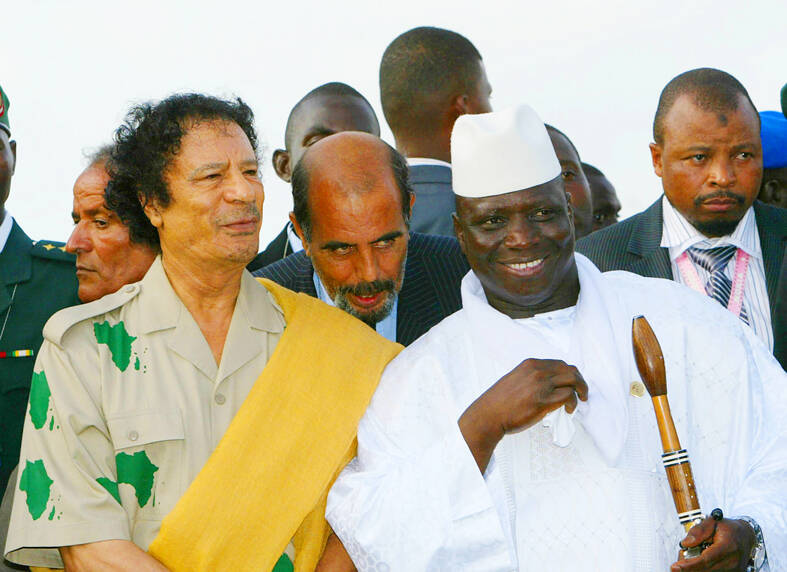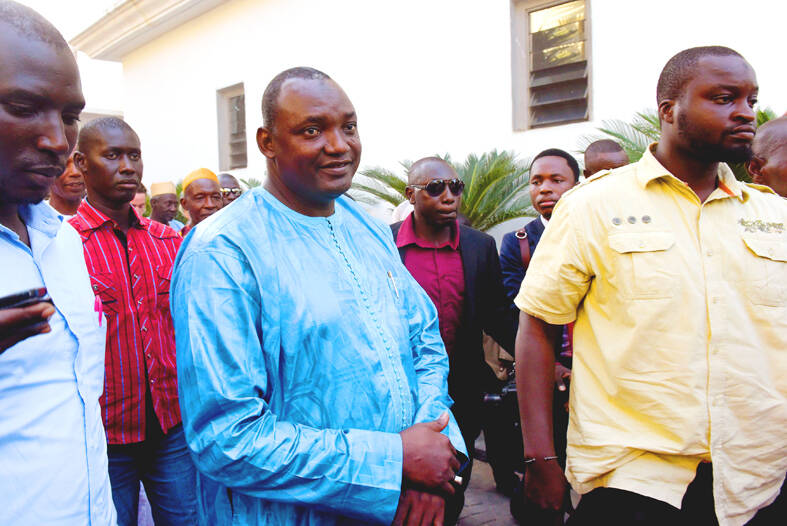The Gambian government on Wednesday said it had thwarted a coup attempt the previous day and arrested four soldiers.
There was no immediate confirmation of the purported plot from other sources and the capital, Banjul, was calm.
“Based on intelligence reports that some soldiers of the Gambian army were plotting to overthrow the democratically elected government of [Gambian] President Adama Barrow, the [armed forces] in a swift military operation ... yesterday arrested four soldiers linked to this alleged coup plot,” the government said in a statement. “The apprehended soldiers are currently helping the military police with their investigations. Meanwhile, the army is in pursuit of three more alleged accomplices.”

Photo: AFP
Gambian police said in a separate statement that they had questioned Momodou Sabally, a former Gambian minister of presidential affairs under former Gambian president Yahya Jammeh, after the release of a video suggesting Barrow would be overthrown before the next local elections.
Scattered witness accounts reported soldier movements near the presidential headquarters in the center of the city on Tuesday evening, and rumors circulated during the night of a possible coup.
However, people interviewed by Agence France-Presse said they had seen no disturbance.

Photo: AFP
Sulayman Njie, 25, a youth advocate and entrepreneur, said he had been attending a national youth conference in Banjul until 4am.
“We did not see anything unusual,” he said.
Momodou Lamin Bah, a Gambian lawmaker whose constituency is in the northern part of the capital, said he had also been attending events at the conference, but witnessed nothing out of the ordinary.
“There is no security presence here because everything is normal,” he said.
The West African state is a fragile democracy, still scarred by Jammeh’s 22 years in office.
Jammeh was defeated in presidential elections in December 2016 by Barrow, then a political newcomer, and fled to Equatorial Guinea, but retains clout back home.
Addressing supporters at a rally in the Gambia on Saturday via telephone, he said he would return soon and would lead the country once more.
Barrow was in December last year re-elected for a second five-year term with 53 percent of the vote.
He won a narrow victory in legislative elections in April, but fell short of an absolute majority in the 58-seat parliament.
The government urged citizens, residents and diplomatic personnel to “carry on with their normal activities as the situation is under total control and there is no need to panic.”
The Gambia’s international partners are exerting pressure on him to push ahead with reforms to bolster the country’s democracy, including an overhaul of the security services.
The Gambia is the smallest country on the African continent, straddling the river that gives it its name.
It has a tiny Atlantic coastline, but is otherwise surrounded by Senegal.
The densely populated nation was a British colony from 1888 until independence in 1965.
Its first president, former Gambian prime minister Dawda Jawara, was overthrown by Jammeh, then a young army officer, in a bloodless coup in 1994.
Jammeh ruled with an iron grip before his surprising election loss in December 2016. He initially refused to accept defeat, but fled into exile after neighboring countries intervened.
In 2017, the Gambian Truth, Reconciliation and Reparation Commission was set up to investigate crimes committed under Jammeh.
It heard nearly 400 witnesses, including victims and former “Junglers,” or members of the regime’s death squads.
Its report, issued in November last year, recorded a litany of death squads, arbitrary arrests, torture and disappearances, and drew up a list of officials it said should be prosecuted.
The Economic Community of West African States on Wednesday said it “strongly condemns” the coup attempt and “stands firmly by the democratically elected government” in the Gambia.
West Africa has been shaken by a series of military power seizures since 2020, in Mali, Guinea and most recently in Burkina Faso.

BOMBARDMENT: Moscow sent more than 440 drones and 32 missiles, Volodymyr Zelenskiy said, in ‘one of the most terrifying strikes’ on the capital in recent months A nighttime Russian missile and drone bombardment of Ukraine killed at least 15 people and injured 116 while they slept in their homes, local officials said yesterday, with the main barrage centering on the capital, Kyiv. Kyiv City Military Administration head Tymur Tkachenko said 14 people were killed and 99 were injured as explosions echoed across the city for hours during the night. The bombardment demolished a nine-story residential building, destroying dozens of apartments. Emergency workers were at the scene to rescue people from under the rubble. Russia flung more than 440 drones and 32 missiles at Ukraine, Ukrainian President Volodymyr Zelenskiy

COMPETITION: The US and Russia make up about 90 percent of the world stockpile and are adding new versions, while China’s nuclear force is steadily rising, SIPRI said Most of the world’s nuclear-armed states continued to modernize their arsenals last year, setting the stage for a new nuclear arms race, the Stockholm International Peace Research Institute (SIPRI) said yesterday. Nuclear powers including the US and Russia — which account for about 90 percent of the world’s stockpile — had spent time last year “upgrading existing weapons and adding newer versions,” researchers said. Since the end of the Cold War, old warheads have generally been dismantled quicker than new ones have been deployed, resulting in a decrease in the overall number of warheads. However, SIPRI said that the trend was likely

‘SHORTSIGHTED’: Using aid as leverage is punitive, would not be regarded well among Pacific Island nations and would further open the door for China, an academic said New Zealand has suspended millions of dollars in budget funding to the Cook Islands, it said yesterday, as the relationship between the two constitutionally linked countries continues to deteriorate amid the island group’s deepening ties with China. A spokesperson for New Zealand Minister of Foreign Affairs Winston Peters said in a statement that New Zealand early this month decided to suspend payment of NZ$18.2 million (US$11 million) in core sector support funding for this year and next year as it “relies on a high trust bilateral relationship.” New Zealand and Australia have become increasingly cautious about China’s growing presence in the Pacific

Indonesia’s Mount Lewotobi Laki-Laki yesterday erupted again with giant ash and smoke plumes after forcing evacuations of villages and flight cancelations, including to and from the resort island of Bali. Several eruptions sent ash up to 5km into the sky on Tuesday evening to yesterday afternoon. An eruption on Tuesday afternoon sent thick, gray clouds 10km into the sky that expanded into a mushroom-shaped ash cloud visible as much as 150km kilometers away. The eruption alert was raised on Tuesday to the highest level and the danger zone where people are recommended to leave was expanded to 8km from the crater. Officers also